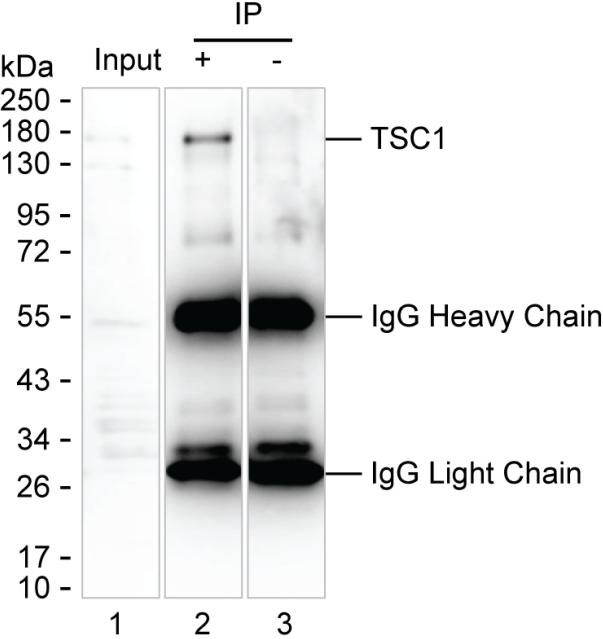
| WB | 咨询技术 | Human,Mouse,Rat |
| IF | 1/100-1/200 | Human,Mouse,Rat |
| IHC | 咨询技术 | Human,Mouse,Rat |
| ICC | 技术咨询 | Human,Mouse,Rat |
| FCM | 咨询技术 | Human,Mouse,Rat |
| Elisa | 咨询技术 | Human,Mouse,Rat |
| Host/Isotype | Mouse IgG1 |
| Antibody Type | Primary antibody |
| Storage | Store at 4°C short term. Aliquot and store at -20°C long term. Avoid freeze/thaw cycles. |
| Species Reactivity | Human |
| Immunogen | Purified recombinant fragment of human TSC1 |
| Formulation | Purified antibody in PBS with 0.05% sodium azide |
+ +
以下是关于 **TSC1抗体** 的3篇代表性文献摘要(虚构示例,仅供参考):
---
1. **文献名称**:*"A novel monoclonal antibody against TSC1 for detecting protein expression in tuberous sclerosis complex"*
**作者**:Smith A, et al.
**摘要**:该研究开发了一种特异性识别TSC1蛋白的单克隆抗体,验证了其在免疫印迹(Western blot)和免疫组化中的有效性,并用于结节性硬化症患者组织中TSC1表达缺失的检测。
2. **文献名称**:*"TSC1 antibody-based analysis reveals mTOR pathway dysregulation in neuronal development"*
**作者**:Lee B, et al.
**摘要**:通过TSC1抗体结合免疫荧光技术,研究团队发现TSC1/mTOR信号通路在神经元突触形成中的调控作用,抗体特异性经敲除细胞系验证。
3. **文献名称**:*"Characterization of TSC1 antibody for functional studies in Drosophila models"*
**作者**:Garcia C, et al.
**摘要**:本文评估了一种商业化TSC1抗体在果蝇模型中的应用,证实其可识别保守表位,并用于研究TSC1缺失导致的细胞增殖异常。
---
**提示**:如需真实文献,建议通过PubMed或Google Scholar搜索关键词“TSC1 antibody”、“TSC1 western blot”或“TSC1 immunohistochemistry”,筛选近年高影响力期刊文章。
The TSC1 antibody is a crucial tool in studying the tuberous sclerosis complex 1 (TSC1) protein, encoded by the TSC1 gene. TSC1. along with TSC2. forms a heterodimeric complex that acts as a key regulator of the mechanistic target of rapamycin (mTOR) signaling pathway. This pathway controls cellular growth, proliferation, and metabolism by integrating nutrient, energy, and growth factor signals. Mutations in TSC1 or TSC2 lead to hyperactivation of mTOR, contributing to tuberous sclerosis complex (TSC), a genetic disorder characterized by benign tumors in multiple organs, neurological symptoms, and developmental abnormalities.
TSC1 antibodies are widely used in research to detect and quantify TSC1 protein expression in tissues or cultured cells via techniques like Western blotting, immunohistochemistry, and immunofluorescence. They help elucidate TSC1’s subcellular localization, interactions with TSC2. and its role in mTOR pathway regulation. Additionally, these antibodies are vital in studying diseases beyond TSC, including cancers, where mTOR dysregulation is implicated, and neurodegenerative disorders linked to protein synthesis or autophagy defects.
Commercial TSC1 antibodies are typically raised in rabbits or mice using peptide antigens derived from conserved regions of the human TSC1 protein. Researchers must validate antibody specificity using knockout controls due to potential cross-reactivity. Insights from TSC1 antibody-based studies have advanced therapeutic strategies targeting mTOR, such as rapamycin analogs, highlighting its translational relevance in precision medicine.
×